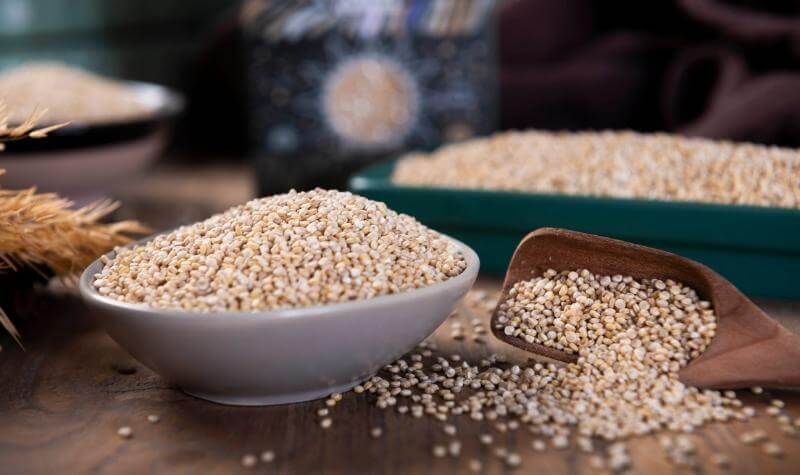Every time health experts rank popular diets, the Mediterranean diet tops the list. It's filled with delicious, good-for-you foods, and can be adjusted to fit any lifestyle. Plus, research shows that it’s especially beneficial for blood sugar.
What is the Mediterranean diet?
The Mediterranean diet is a way of eating based on the traditional foods and cooking methods of countries bordering the Mediterranean Sea1. The diet is rich in vegetables, fruits, whole grains, legumes, nuts, and healthy fats like olive oil. It also includes moderate fish and poultry while limiting red meat and processed foods.
Unlike many so-called diets, the Mediterranean diet isn't necessarily a strict set of guidelines but rather a pattern of eating that emphasizes whole, unprocessed foods and allows for plenty of variety. The foods included are high in fiber, micronutrients, antioxidants and low in processed foods.
What types of foods are included in the Mediterranean diet?
The Mediterranean diet focuses on the following foods:
Healthy fats

- Olives and olive oil
- Avocado oil
- Oily fish
- Nuts and seeds
Minimally processed unsaturated fats are staples of the Mediterranean diet. Monounsaturated fats from olive oil are linked to various health benefits, including a lower risk of heart disease2. Polyunsaturated fats (primarily omega-3s) from oily fish are beneficial for the heart and may also help to improve blood sugar balance3.
Olive oil is also rich in polyphenols, naturally occurring chemicals from plants with antioxidant effects4. These antioxidants may help protect cells from damage and reduce the risk of chronic disease5.
Whole grains and legumes

- Brown rice
- Quinoa
- Lentils
- Beans
- Amaranth
- Farro
- Kamut
- Oats
- Rye
- Millett
Fiber from whole grains and legumes can help regulate blood sugar levels, lower cholesterol, and promote satiety6. They also support healthy gut bacteria, which is essential for overall health7.
Legumes are low glycemic and contain protein which can help to keep you feeling full and satisfied after eating. It's worth mentioning that since these foods are higher in carbohydrates, each person will have a different blood sugar response, so you may need to experiment with optimal portion size for your body.
Nuts and seeds

- Walnuts
- Pumpkin seeds
- Almonds
- Sunflower seeds
- Chia seeds
- Flax seeds
Nuts, nut butters and seeds contain fiber, protein, and healthy fats. They are also rich in antioxidants and minerals like magnesium and potassium, which help with blood sugar balance and cardiovascular protection8.
Brightly colored produce

- Spinach
- Kale
- Chard
- Broccoli
- Cauliflower
- Bell pepper
- Cucumber
- Orange
- Berries
- Apple
- Tomato
- Arugula
- Avocado
- Lemon
- Grapes
- Beets
- Sweet potato
- Cabbage
- Celery
- Onion
- Garlic
- Mushroom
- Squash
- Zucchini
- Cherries
- Figs
- Carrots
Fresh fruits and vegetables are filled with fiber, vitamins, minerals, antioxidants, and polyphenols. Each type of produce provides different health benefits, so it's essential to include a variety in your diet as they work together to benefit your health.
A large meta-analysis found that eating more fruits and vegetables, especially berries, leafy greens, yellow vegetables like squash, and cruciferous vegetables (broccoli, cabbage, cauliflower, kale) is associated with a lower risk of type 2 diabetes and promotes healthy blood sugar9.
The color of produce is also an indication of its antioxidant content. The polyphenols in brightly colored produce can help protect cells from damage and reduce the risk of chronic disease10.
Lean proteins, especially fish

- Salmon
- Sardines
- Chicken
- Turkey
- Pork
- Shellfish
Protein is vital for blood sugar balance because it slows down the blood sugar response, so you are less likely to see glucose spikes. Fish is also a great source of protein and heart-healthy omega- 3 fatty acids.
Can you drink alcohol on the Mediterranean diet?
Moderate alcohol consumption, primarily red wine, is part of the Mediterranean diet. Red wine can have health benefits when consumed in moderation because it contains resveratrol, a polyphenol with antioxidant effects11.
Resveratrol is linked to heart health, but there are other ways to support your health if wine doesn't work with your lifestyle or you abstain from alcohol12.
{{mid-cta}}
What types of foods are limited in the Mediterranean diet?
The Mediterranean pattern includes so many delicious foods that you may not even miss the not-so-healthy options. The following are usually limited:
Refined and processed carbs
- White flour
- Sugar
- Candy
- Baked goods
- Ice cream
- Pasta (made with white flour)
- Cookies
- Soda
- Chips
Refined and processed carbs are low in nutrients and high in sugar, leading to blood sugar spikes. They are also often made with unhealthy ingredients.
Does it mean you can't ever eat these foods if you're following a Mediterranean diet? No, but ideally, you save them for special occasions.
Red and processed meat
Processed meat like hot dogs, bacon, and sausage is not typically eaten on the Mediterranean diet. If you eat red meat, the Mediterranean diet limits it to a couple of times a week at most.
Are the foods in the Mediterranean diet good for blood sugar?
Yes! And the research backs it up. The Mediterranean diet is well-researched for its blood sugar benefits. Multiple extensive studies link a Mediterranean eating pattern with a reduced risk of type 2 diabetes13.
Compared to a low-fat diet, the Mediterranean diet is significantly more effective for lowering diabetes risk14. It also is linked to more weight loss, better glycemic control, and a reduced risk of cardiovascular disease than a low-fat diet15.
The foods emphasized in the Mediterranean diet are all beneficial for blood sugar balance, including fiber, healthy fat, and fresh fruits and veggies.

Is the Mediterranean diet healthy?
Beyond blood sugar control, the Mediterranean diet is linked to many other health benefits, including16:
- Heart disease. Studies show that the Mediterranean diet can help protect against heart disease by reducing cholesterol, inflammation and improving blood pressure and insulin sensitivity17, 18.
- Weight loss. The Mediterranean diet may promote a healthy weight because it's rich in fiber and protein, which help to satiate hunger and balance blood sugar. A systematic review of the Mediterranean diet and weight loss found that it results in similar weight loss as other diets, which may help people tired of more restrictive diets19.
- Cancer. Since the Mediterranean diet is high in antioxidants and anti-inflammatory polyphenols, some research suggests the more closely a person follows the pattern, the lower their cancer risk20.
- Brain and cognitive health. The Mediterranean diet is high in omega-3 fatty acids, beneficial for brain health. The polyphenols found in foods found in this pattern may also help to protect the brain from age-related changes, especially inflammation21.
- Mental health. The antioxidants and anti-inflammatory nutrients found in the Mediterranean diet may help protect mental health, especially for older adults22, 23.
How can I incorporate the Mediterranean diet into my life?
Since the Mediterranean diet is less of a typical rigid diet and more like a pattern, there are many ways you can incorporate it into your life. Remember that we all have different responses to food, so you can see what works best for you as you experiment with different foods.
For example, the Mediterranean diet is not necessarily a low-carb diet, but you may be someone who feels better eating fewer carbs, so your focus would be more on vegetables, lean protein, nuts, and seeds.
<p class="pro-tip">Read more about the best nuts for blood sugar</p>
Alternatively, someone else may do well with more whole grains and legumes (this is when a continuous glucose monitor (CGM) could also help you see your personal blood sugar response to the foods).

How to get started with the Mediterranean diet
- Eliminate processed foods and eat more whole grains, fruits, and vegetables.
- Include healthy fats like olive oil in your cooking and as dressing.
- Enjoy fish at least twice a week.
- Add nuts and seeds to your diet.
- Increase your intake of fiber and antioxidants by eating more vegetables, whole grains, and legumes.
- Avoid sugary drinks and processed foods.
Final takeaway
The Mediterranean diet supports blood sugar balance because it's rich in fiber, antioxidants, omega-3 fatty acids, and anti-inflammatory nutrients. From weight loss to heart health, the benefits of this traditional pattern are well documented.
Get the most out of the Mediterranean diet with Signos
The best way to follow the Mediterranean diet is to customize it to fit your lifestyle. Using a CGM paired with the Signos app makes it easy to find what works for you.
<p class="pro-tip">Learn more about using Signos to optimize your blood sugar</p>
- Item 1
- Item 2
- item 3
Topics discussed in this article:
References
- Davis, C., Bryan, J., Hodgson, J., & Murphy, K. (2015). Definition of the Mediterranean Diet; a Literature Review. Nutrients, 7(11), 9139–9153. https://doi.org/10.3390/nu7115459
- Gaforio, J. J., Visioli, F., Alarcón-de-la-Lastra, C., Castañer, O., Delgado-Rodríguez, M., Fitó, M., Hernández, A. F., Huertas, J. R., Martínez-González, M. A., Menendez, J. A., Osada, J., Papadaki, A., Parrón, T., Pereira, J. E., Rosillo, M. A., Sánchez-Quesada, C., Schwingshackl, L., Toledo, E., & Tsatsakis, A. M. (2019). Virgin Olive Oil and Health: Summary of the III International Conference on Virgin Olive Oil and Health Consensus Report, JAEN (Spain) 2018. Nutrients, 11(9), 2039. https://doi.org/10.3390/nu11092039
- Khan, S. U., Lone, A. N., Khan, M. S., Virani, S. S., Blumenthal, R. S., Nasir, K., Miller, M., Michos, E. D., Ballantyne, C. M., Boden, W. E., & Bhatt, D. L. (2021). Effect of omega-3 fatty acids on cardiovascular outcomes: A systematic review and meta-analysis. EClinicalMedicine, 38, 100997. https://doi.org/10.1016/j.eclinm.2021.100997
- Gorzynik-Debicka, M., Przychodzen, P., Cappello, F., Kuban-Jankowska, A., Marino Gammazza, A., Knap, N., Wozniak, M., & Gorska-Ponikowska, M. (2018). Potential Health Benefits of Olive Oil and Plant Polyphenols. International journal of molecular sciences, 19(3), 686. https://doi.org/10.3390/ijms19030686
- Willcox, J. K., Ash, S. L., & Catignani, G. L. (2004). Antioxidants and prevention of chronic disease. Critical reviews in food science and nutrition, 44(4), 275–295. https://doi.org/10.1080/10408690490468489
- Kaczmarczyk, M. M., Miller, M. J., & Freund, G. G. (2012). The health benefits of dietary fiber: beyond the usual suspects of type 2 diabetes mellitus, cardiovascular disease and colon cancer. Metabolism: clinical and experimental, 61(8), 1058–1066. https://doi.org/10.1016/j.metabol.2012.01.017
- Myhrstad, M., Tunsjø, H., Charnock, C., & Telle-Hansen, V. H. (2020). Dietary Fiber, Gut Microbiota, and Metabolic Regulation-Current Status in Human Randomized Trials. Nutrients, 12(3), 859. https://doi.org/10.3390/nu12030859
- Kim, Y., Keogh, J. B., & Clifton, P. M. (2017). Benefits of Nut Consumption on Insulin Resistance and Cardiovascular Risk Factors: Multiple Potential Mechanisms of Actions. Nutrients, 9(11), 1271. https://doi.org/10.3390/nu9111271
- Wang, P. Y., Fang, J. C., Gao, Z. H., Zhang, C., & Xie, S. Y. (2016). Higher intake of fruits, vegetables or their fiber reduces the risk of type 2 diabetes: A meta-analysis. Journal of diabetes investigation, 7(1), 56–69. https://doi.org/10.1111/jdi.12376
- Fraga, C. G., , Croft, K. D., , Kennedy, D. O., , & Tomás-Barberán, F. A., (2019). The effects of polyphenols and other bioactives on human health. Food & function, 10(2), 514–528. https://doi.org/10.1039/c8fo01997e
- Ditano-Vázquez, P., Torres-Peña, J. D., Galeano-Valle, F., Pérez-Caballero, A. I., Demelo-Rodríguez, P., Lopez-Miranda, J., Katsiki, N., Delgado-Lista, J., & Alvarez-Sala-Walther, L. A. (2019). The Fluid Aspect of the Mediterranean Diet in the Prevention and Management of Cardiovascular Disease and Diabetes: The Role of Polyphenol Content in Moderate Consumption of Wine and Olive Oil. Nutrients, 11(11), 2833. https://doi.org/10.3390/nu11112833
- Dyck, G., Raj, P., Zieroth, S., Dyck, J., & Ezekowitz, J. A. (2019). The Effects of Resveratrol in Patients with Cardiovascular Disease and Heart Failure: A Narrative Review. International journal of molecular sciences, 20(4), 904. https://doi.org/10.3390/ijms20040904
- Boucher, Jackie L. (2017). Mediterranean Eating Pattern. Diabetes Spectr 1 30(2),72. https://doi.org/10.2337/ds16-0074
- Salas-Salvadó, J., Bulló, M., Babio, N., Martínez-González, M. Á., Ibarrola-Jurado, N., Basora, J., Estruch, R., Covas, M. I., Corella, D., Arós, F., Ruiz-Gutiérrez, V., Ros, E., & PREDIMED Study Investigators (2011). Reduction in the incidence of type 2 diabetes with the Mediterranean diet: results of the PREDIMED-Reus nutrition intervention randomized trial. Diabetes care, 34(1), 14–19. https://doi.org/10.2337/dc10-1288
- Esposito, K., Maiorino, M. I., Ciotola, M., Di Palo, C., Scognamiglio, P., Gicchino, M., Petrizzo, M., Saccomanno, F., Beneduce, F., Ceriello, A., & Giugliano, D. (2009). Effects of a Mediterranean-style diet on the need for antihyperglycemic drug therapy in patients with newly diagnosed type 2 diabetes: a randomized trial. Annals of internal medicine, 151(5), 306–314. https://doi.org/10.7326/0003-4819-151-5-200909010-00004
- Manzoni, G. M., Castelnuovo, G., & Molinari, E. (2008). Weight loss with a low-carbohydrate, Mediterranean, or low-fat diet. The New England journal of medicine, 359(20), 2170–2172.
- Ciccarone, E., Di Castelnuovo, A., Salcuni, M., Siani, A., Giacco, A., Donati, M. B., De Gaetano, G., Capani, F., Iacoviello, L., & Gendiabe Investigators (2003). A high-score Mediterranean dietary pattern is associated with a reduced risk of peripheral arterial disease in Italian patients with Type 2 diabetes. Journal of thrombosis and haemostasis : JTH, 1(8), 1744–1752. https://doi.org/10.1046/j.1538-7836.2003.00323.x
- Mena, M. P., Sacanella, E., Vazquez-Agell, M., Morales, M., Fitó, M., Escoda, R., Serrano-Martínez, M., Salas-Salvadó, J., Benages, N., Casas, R., Lamuela-Raventós, R. M., Masanes, F., Ros, E., & Estruch, R. (2009). Inhibition of circulating immune cell activation: a molecular antiinflammatory effect of the Mediterranean diet. The American journal of clinical nutrition, 89(1), 248–256. https://doi.org/10.3945/ajcn.2008.26094
- Mancini, J. G., Filion, K. B., Atallah, R., & Eisenberg, M. J. (2016). Systematic Review of the Mediterranean Diet for Long-Term Weight Loss. The American journal of medicine, 129(4), 407–415.e4. https://doi.org/10.1016/j.amjmed.2015.11.028
- Mentella, M. C., Scaldaferri, F., Ricci, C., Gasbarrini, A., & Miggiano, G. (2019). Cancer and Mediterranean Diet: A Review. Nutrients, 11(9), 2059. https://doi.org/10.3390/nu11092059
- Féart, C., Samieri, C., & Barberger-Gateau, P. (2010). Mediterranean diet and cognitive function in older adults. Current opinion in clinical nutrition and metabolic care, 13(1), 14–18. https://doi.org/10.1097/MCO.0b013e3283331fe4
- Ventriglio, A., Sancassiani, F., Contu, M. P., Latorre, M., Di Slavatore, M., Fornaro, M., & Bhugra, D. (2020). Mediterranean Diet and its Benefits on Health and Mental Health: A Literature Review. Clinical practice and epidemiology in mental health : CP & EMH, 16(Suppl-1), 156–164. https://doi.org/10.2174/1745017902016010156
- Skarupski, K. A., Tangney, C. C., Li, H., Evans, D. A., & Morris, M. C. (2013). Mediterranean diet and depressive symptoms among older adults over time. The journal of nutrition, health & aging, 17(5), 441–445. https://doi.org/10.1007/s12603-012-0437-x










.jpg)





















